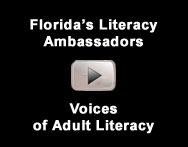


   |
 |
|
|
Adult Learner Mentor and Orientation Programs The Lake County Library System (LCLS) Adult Literacy Program is designed to serve Limited English Proficient (LEP) adults and adult English language learners who are interested in improving their English skills - conversation, reading, writing, comprehension, and basic math. It is a volunteer-based program which offers one-to-one and small group tutoring. Trained volunteer tutors and adult learners meet weekly at their local library or other established community-based satellite location and have access to student workbooks; adult literacy materials; a computer-based literacy lab; and other library resources. The adult learner, with the guidance of the tutor, identifies their learning goals and sets the pace to achieving them. Purpose: In an effort to improve the Adult Literacy Program at the adult learner level, we have implemented a Learner Mentor Program (launched March 2009) and a Learner Orientation Program (launched December 2008). They focus on providing support, information and improved 'service' delivery. As the program grew LCLS realized that they were not effectively pairing learners and tutors. Tutors might only know a brief bio of the learner (see attached Learner Information Form), which included no assessment, and would go to their first meeting ‘blind’. Many times this resulted in an abbreviated first meeting with no actual literacy activities occurring. In addition, it made it quite difficult to ‘market’ learners to volunteer tutors as we had limited or basic information and little to no goal identification. |
|
Learner Orientation You will note from the overview sheet that LCLS utilizes an informal assessment approach. The tools provide LCLS with literacy skill levels that relate back to the materials and resources LCLS has available in the Adult New Reader (ANR) collection located at each library. These materials are almost exclusively based on literacy levels (literacy, beginning, low intermediate, etc…) versus grade levels. The tutors have the choice of assessment tools that they feel are appropriate to the learner and usually combine multiple tools at each orientation meeting. The Learner Agreement form outlines the basic expectations of the program, volunteer tutor and adult learner. LCLS asks that both the learners and tutors respect each other – specifically, be prepared, be on time, and, in a timely manner, notify each other when you cannot make meetings or need to reschedule meeting days or times. Also included is what can be expected of the program – availability of space, free materials and resources, and confidentiality. In addition, during the Learner Orientation meeting the tutor attempts to provide a sample of literacy materials and computer-based and Adult New Reader collection resources and/or discusses the process and next steps so that the learner is more prepared. Finally, they will offer a tour of the literacy space and library, time available and as appropriate. (See: Learner Agreement Form) Most importantly the orientation meeting provides the learner with a sense that the program is organized, has a process for enrolling learners and matching them with a volunteer tutor, and that it is important. This process provides an opportunity for the learner to decide how committed they are to the program. Sometimes the process is much more difficult or demanding than the adult learner initially realizes. Learner Mentor Program
LCLS has seen an increase in successful pairings and attendance at special events as well as having been able to reschedule meeting days/times for learners who would have otherwise left the program (fearing they did not have the right to ask to make changes). Probably the most important outcome to date has been the identification of struggling tutors and learner frustrations. Challenges:“I don’t truly believe that we had any major ‘kinks’ but, rather, evolved as we went along. Updating report forms, increasing duties for the mentors, growing the programs to more literacy locations, etc… I would say that that the only possible kink could be that we do not have learner mentors at all of the literacy locations. A goal I am striving to accomplish!” said Erika Greene, LCLS program director. Evidence of Impact and Effectiveness:LCLS uses forms for reporting, utilizes verbal feedback from the mentors and orientation tutors, and encourages feedback from tutors and adult learners. Learner Orientation Program Since the implementation of the Learner Orientation Program we have seen:
Learner Mentor Program As discussed above, we were fully cognizant that we were not consistently and effectively communicating with our ELLs which was greatly reducing learner and tutor satisfaction as well as impacting learner attrition. Furthermore, we did not have in place a process for providing leadership roles. This program supports both needs. Both of these program components have enhanced the LCLS Adult Literacy Program and enabled the program to deliver literacy services to the adult learners more successfully. And, in a sense, allowed the literacy staff to focus on developing new initiatives and respond to other programmatic and learner needs. As discussed above, awareness of learner interests and concerns would have gone unaddressed or sporadically addressed, at best. Some typical concerns:
Words of Advice: LCLS advises that:
Costs and Funding: Other than printing costs for forms there really are no additional costs associated with launching and maintaining these programs. Other than time, that is:
Learner persistence and goal achievement as it relates to those learners who have been reassigned to a new tutor in response to feedback received by the learner mentor. I believe that we have also seen improved attendance at locations that have access to a learner mentor. Communication has improved, scheduling of initial meetings with new learners has improved, and tutor frustration has been reduced as they have a source of learner feedback. Resources:
Contact Information: Erika L. Greene, Literacy Coordinator
|
 |
 |
 |
 |
 |
 |
 |
|
.Florida Literacy Coalition Florida Literacy Hotline |